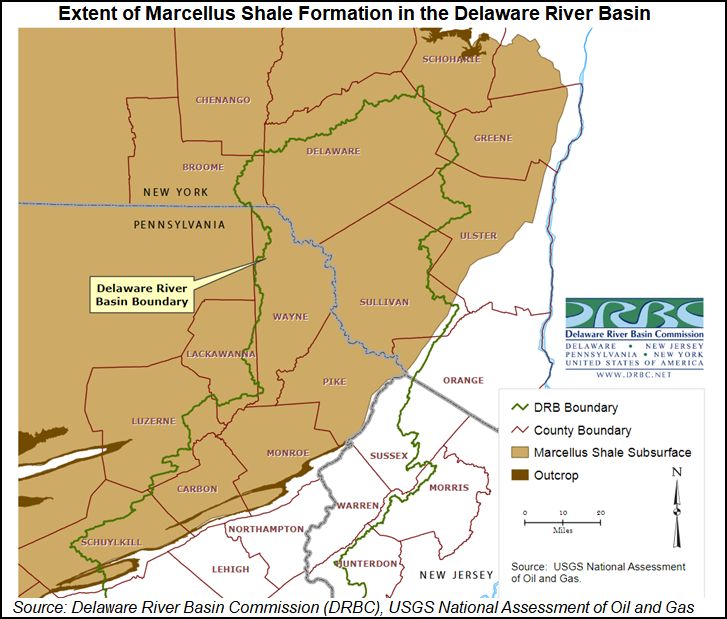Utica Shale | Marcellus | NGI All News Access | NGI The Weekly Gas Market Report | Regulatory
Delaware River Basin Commission Proposes Permanent Ban on Fracking, Other Restrictions
The Delaware River Basin Commission (DRBC) on Thursday proposed to permanently ban high-volume hydraulic fracturing (HVHF) across its four-state region and rules changes to discourage fresh water exports and wastewater imports.

The commission posted an eight-page document outlining a draft version of amendments to its regulations and comprehensive plan. Commissioners justified the HVHF ban, in part, saying they had determined the practice “poses significant, immediate and long-term risks to the development, conservation, utilization, management, and preservation of the water resources” within the basin.
Much of the Delaware River Basin acreage in New York and Pennsylvania overlaps the Marcellus Shale.
Four public hearings are scheduled in January and February to discuss the proposed changes. Two hearings are to be held in Waymart, PA, on Jan. 23, followed by two hearings in Philadelphia on Jan. 25. Registration to attend a hearing is required. The DRBC said advanced registration for the hearings would remain open until Dec. 31, and it would accept written comments until Feb. 28. A final vote on the proposed changes is expected sometime after.
“These proposed regulations amount to a taking and deny Pennsylvania citizens the right to develop their own property rights,” said Marcellus Shale Coalition’s David Spigelmyer, president. “It flies in the face of settled science and common sense environmental regulation, and would bring self-inflicted economic harm to the commonwealth.”
While the DRBC would officially discourage “the diversion, transfer or exportation of water” to support fracking outside the basin, such moves could still be performed under the proposed rulemaking. Operators would need commission approval in the form of a docket, and any water moves would be subject to an evaluation under the DRBC’s Water Code.
Importing produced water or wastewater from a centralized waste treatment facility would also be discouraged, but imports would be permitted “by a new or existing wastewater treatment facility located within the basin.” The transfer, treatment or discharge to other facilities within the basin, regardless of volume or rate, would also need approval through a docket at the DRBC, or through a state permit issued following an agreement between the DRBC and the host state.
Last September, the DRBC voted 3-1, with one abstention, to adopt a resolution calling for a rulemaking that could ultimately lead to an HVHF ban and other restrictions.
The DRBC is led by the governors of the four basin states — Delaware, Pennsylvania, New Jersey and New York — and the federal government, represented by the commander of the U.S. Army Corps of Engineers’ North Atlantic division.
The DRBC said in 2009 all gas drilling in the basin needed to be reviewed but said it would not approve any development until rules were adopted governing the industry. The agency postponed the gas development review in 2010 and failed to act on adopting new rules in 2011, leaving in place a de facto moratorium.
Environmental groups on Friday said they supported the HVHF ban, but indicated disappointment that related activities, including water withdrawals and wastewater injections, were not banned.
“While we are thrilled that the DRBC finally heard our demands for a ban on fracking, it doesn’t feel like progress to those of us who are not sitting atop shale formations and are, therefore, only losing ground with regulations that allow previously prohibited activities,” said Berks Gas Truth’s Karen Feridun, founder of the environmental group.
Delaware Riverkeeper Maya van Rossum said opponents of oil and gas development in the basin “will not rest until all activities related to fracking are banned as well. It makes no sense to ban fracking and allow frack waste to be dumped in the watershed.”
© 2024 Natural Gas Intelligence. All rights reserved.
ISSN © 2577-9877 | ISSN © 1532-1266 | ISSN © 2158-8023 |
